Dyslexia facts, myths and strategies
0 Replies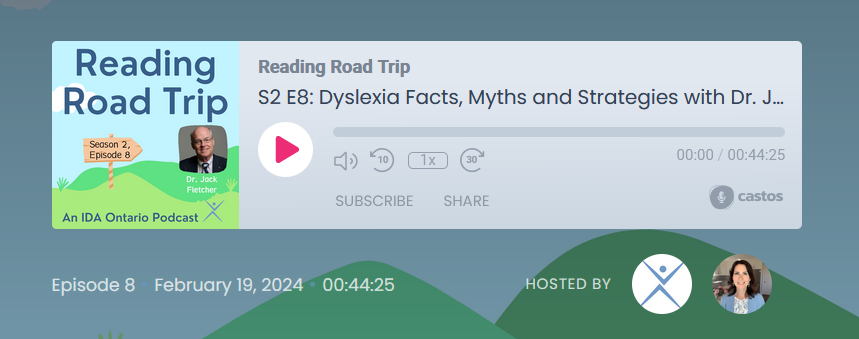
I’ve just listened to a great Ontario IDA Reading Road Trip podcast, in which the IDA’s Kate Winn interviews Dr Jack Fletcher about dyslexia facts, myths and strategies. Click here to listen to the whole thing yourself, and/or read the transcript, which includes references. For the time-poor and my own learning, here’s what I thought were key takeaways.
Defining and diagnosing dyslexia
Dyslexia is a word-level reading and spelling problem which results from a combination of biological and environmental factors. It’s a persistent inability to respond to the kind of explicit, intensive, instruction that works for most people.
Instructional response is the most important criterion for diagnosing anyone with a Specific Learning Disorder, especially dyslexia. Diagnosis should be based on multiple criteria, including progress monitoring measures from intervention, and norm-referenced achievement testing. Specialist dyslexia assessment tools aren’t helpful or necessary. Cognitive tests are only useful in identifying kids who are at risk in the first two years of schooling. After grade two, assessment should be focussed on academic measures of reading, spelling, and writing.
It’s not valid to diagnose dyslexia based on a discrepancy between cognitive skills and academic performance. Kids with reading problems with high and low IQs have the same difficulties with phonological awareness, rapid naming and so on. IQ tests have racial and social bias, so there are social justice issues associated with their use. A Pattern of Strengths And Weaknesses model is also a discrepancy model, is typically inaccurate and grossly under-identifies kids with learning disabilities. We also need to be aware of English Language Learners when identifying at-risk kids, so they’re not misidentified.
Related/co-occurring difficulties
Other kinds of learning disorders and difficulties often co-occur with dyslexia, such as problems with writing or mathematics. Kids with dyslexia often also have difficulties with attention and/or language needing separate intervention. Stimulant medication can help a child pay attention but it won’t teach them how to read. Learning to read words doesn’t guarantee you’ll know what they mean.
About 25% of kids with dyslexia have clinical levels of anxiety. Anxiety predicts a poorer response to intervention, so one US expert, Sharon Vaughn, has introduced five minutes of mindfulness meditation at the start of intervention sessions, to reduce anxiety.
Psychiatrist Shepherd Kellam studied an approach which prevented behaviour problems, but found this didn’t help kids improve their reading. So he introduced a reading intervention, and found that when they became better readers, the girls were less depressed and the boys were less disruptive. He also found that kids all knew who was struggling with reading, and that this was a source of anxiety.
Can dyslexia be prevented?
Many severe reading problems can be prevented if kids get the right kind of explicit instruction and reading experience in their first three years of schooling. About 40% of kids find it hard to learn to read well without really explicit and fairly intense instruction and early reading experience. This makes them aware of the sounds in spoken words and helps them grasp the idea that these sounds are what letters represent (the alphabetic principle) and develops their brains as mediators of reading. Early access to print gives the brain the kind of visual experience it needs to become an automatic reader.
If kids don’t learn to read in the first three years of schooling, it’s very hard for them fully develop their neural system and get the reading experience and vocabulary they need to become skilled, automatic readers. They can be taught to decode, but end up with persistent reading problems. Intervention in first and second grade is twice as effective as intervention after the third grade. It’s hard to differentiate reading problems due to biology and those which are due to environment. Brain scans of third grade poor readers who were not taught well and third grade poor readers at biological risk of dyslexia look the same.
Poor instruction is unfortunately still quite common, though teachers are not to blame, they always have good intentions. They just may not have the training and the knowledge that they need to be effective instructors for kids who are at risk. Improving and maintaining high-quality instruction, including classroom management, needs to be an ongoing priority.
What kind of intervention?
Explicit, systematic instruction in the general early years classroom works for everyone, but works twice as well for the at-risk kids (see this research by Barbara Foorman et al). There should be systematic, explicit phonics: teaching the relationship between what words sound like and what they look like. There should also be cumulative practice of skills to automaticity, and work on comprehension. Reading and writing strengths and weaknesses should be monitored, and intervention adjusted accordingly.
If you are including all these elements and collecting data towards your benchmark, and making good progress, then you should just continue until students achieve the benchmark.
Research by the late Carol Connor suggests decoding/word level intervention is about four times more effective in a small group (3 or 4 children per teacher) than a large group, as long as the groups are well matched and managed. This makes sense, as in phonics lessons, teachers have to listen closely to each child, and notice and correct their errors. There’s no evidence that individual phonics instruction is better than this kind of well-matched small group work (click here for information about upcoming Spelfabet holiday groups). The best indicator of which kids should be grouped together is their reading fluency.
Meaning-based instruction, on the other hand, can be done equally well in small or large groups. For English Language Learners, quality of instruction seems to make more difference than language of instruction.
Myths about dyslexia
Dyslexia is not a gift. The myth that people with dyslexia have special talents might result from individual differences and the natural orientation of development towards strengths.
People with dyslexia don’t see letters backwards. As we learn to read, we see mirror images of words in both sides of the brain, which gradually lateralises to the left side of the brain. This happens more slowly in people with dyslexia.
Other myths include: that coloured lenses or overlays help with reading; that dyslexia is a reading comprehension problem; that it’s rare; that people grow out of it; that Brain Training programs not involving reading instruction work; and that improving home literacy will overcome dyslexia. See the blue box on the right of Fletcher and Vaughn’s interesting article titled “Identifying and Teaching Students with Significant Reading Problems for the full list of 18 myths Dr Fletcher refers to in the podcast.
Thanks a quintillion to Kate Winn and Ontario IDA for this interesting podcast series, I’ll be going through the back catalogue in coming weeks, and just noticed a new 4 March 2024 episode pop up, with Australia’s own Dr Jennifer Buckingham. One for tomorrow’s morning dog walk, methinks.
Ten cheers for our new Children’s Laureate!
0 Replies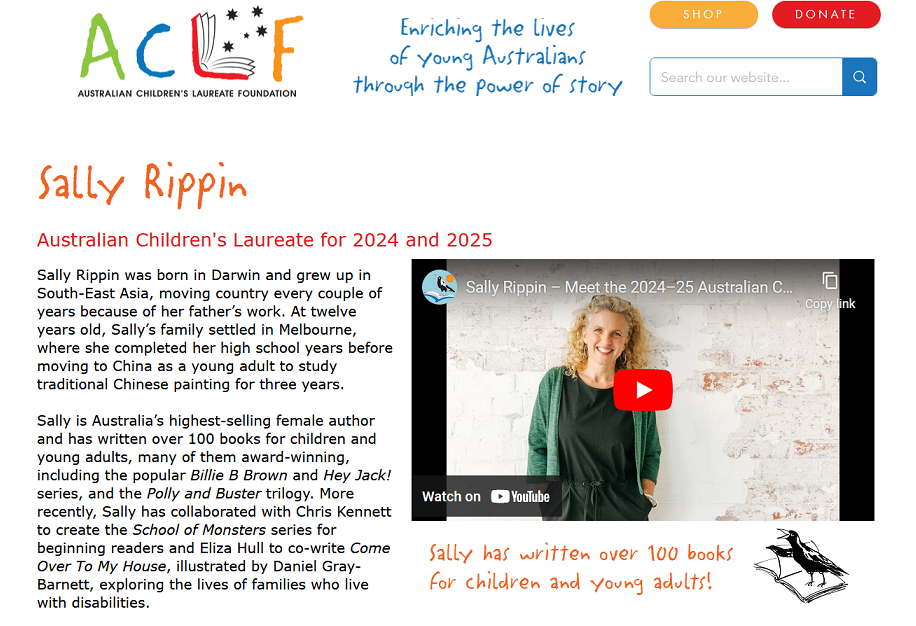
I was so excited to be invited to the launch of Sally Rippin’s two year program as Australian Children’s Laureate on Tuesday, though surprised to spot a former colleague in the crowd who was once staunchly anti-phonics and pro Reading Recovery/Fountas and Pinnell.
Then I realised: Sally is the Perzackly Perfect Person to cheer people off the sinking Balanced Literacy ship (especially since the Grattan Institute’s Reading Guarantee report), and onto ship Structured Literacy, so all kids can hurry up and start enjoying wonderful stories.
Sally isn’t just an author of great kids’ books, she’s the mum of a neurodivergent kid who struggled to read and spell, and a staunch advocate of making sure all kids are taught to crack our spelling code, instead of being encouraged to memorise and guess words. Her book for adults about this, Wild Things: how we learn to read, and what can happen if we don’t, should be in every school and local library. Here she is at the launch with queen of our activist dyslexia mums, Dyslexia Victoria Support founder Heidi Gregory.
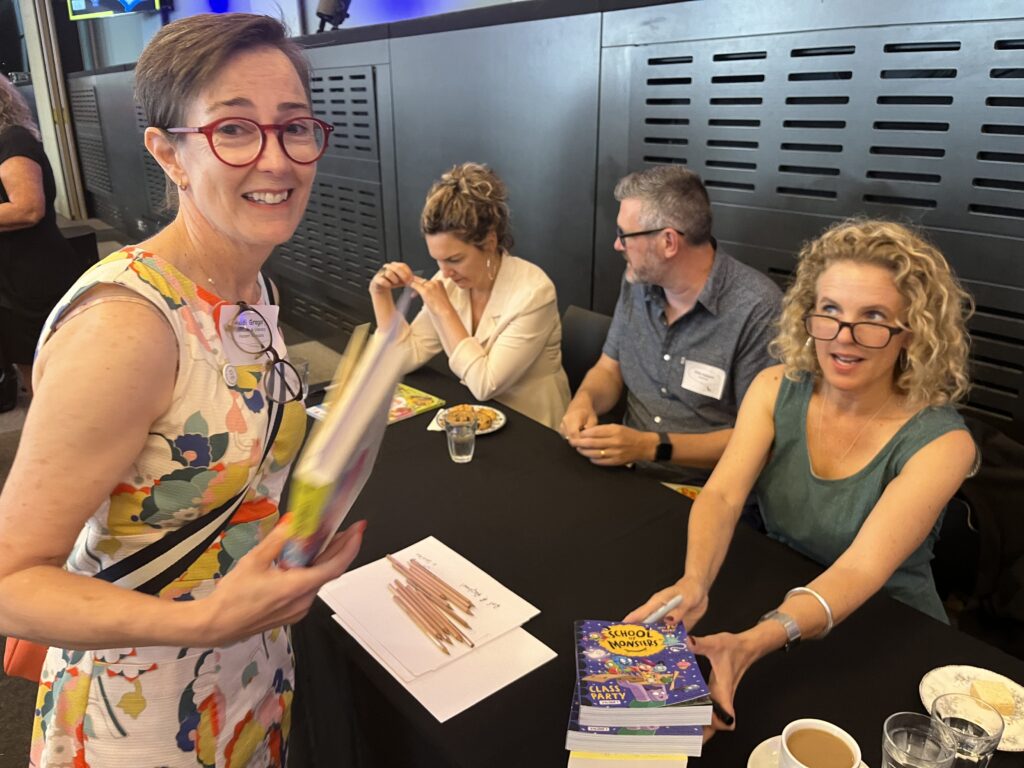
Sally’s term as Children’s Laureate is the perfect time for a strong push to dump dross like predictable/repetitive texts and rote-memorisation of high frequency word lists, and promote things like decodable texts and systematic, explicit phonics teaching in Years F-2. It’s also the perfect time to improve early identification and intervention for neurodivergent kids in schools, and knock down barriers to reading for all kids.
The Grattan Institute report (there’s a podcast about it here, and a 20-minute YouTube summary here) says kids with poor literacy currently in school could cost taxpayers $40 billion over their lifetimes, not to mention the personal cost to those kids. I cannot think of a better use of my taxes than ensuring all schools use literacy-teaching methods that are based on the best available evidence, and that struggling and neurodiverse kids whose parents can’t afford high-quality private intervention don’t miss out on it.
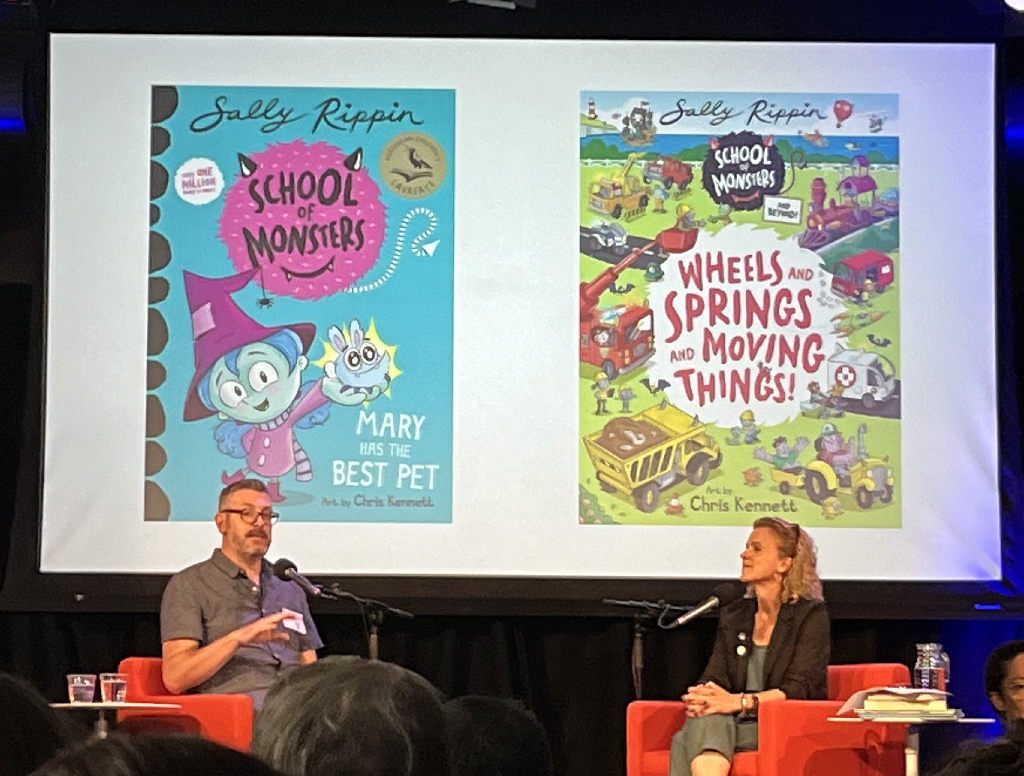
At the launch I also got a copy of Come Over To My House, a picture book co-authored by Eliza Hull, full of stories about making the world more accessible for everyone. It’s perfect for our waiting room. I also got some School Of Monsters compilations for our lending library, signed by Sally and illustrator Chris Kennett (who also drew little bats on them). Chris taught everyone at the launch how to draw a monster, which was rather hilarious.
Sally will be travelling all over Australia in the next two years, so make sure you find out when she is coming to a town or city near you (the ACLF newsletter and social media information is here), and spread the word. It’s a story well worth telling.
Benchmark Assessment: often wrong
0 RepliesIt’s the end of the school year in Australia, so children are getting their end-of-year reports.
Many Australian schools use the American Fountas and Pinnell Benchmark Assessment System (BAS) to evaluate reading skills, but a new American Public Media (APM) report says it fails to identify most struggling readers.
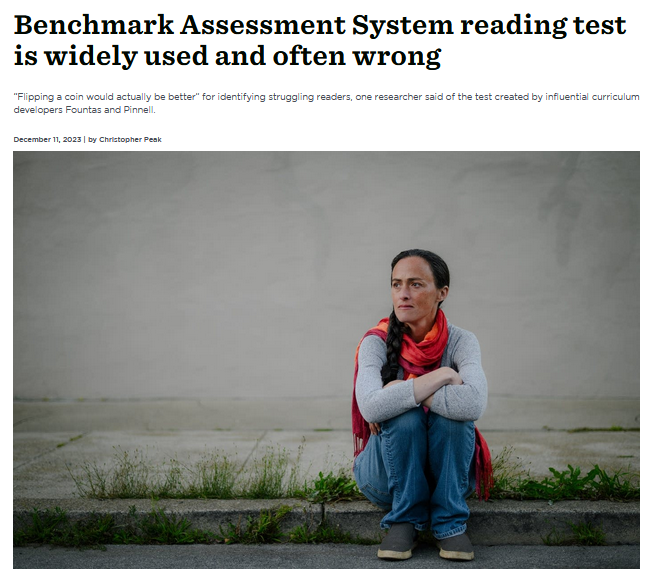
If teachers rely on the BAS results, they will be advising many parents not to worry about their children’s reading skills, though there’s good reason to be concerned.
If you’re in this situation, please seek more reliable and valid assessment. Early intervention is highly effective, and ‘late bloomers’ are more likely to wilt and suffer than catch up.
There are plenty of more cost-effective, efficient, reliable, valid literacy skill assessments available for school use. The excellent, Australian Reading Science in Schools website has an assessment list you can download here. Chances are that teachers using the BAS don’t know about researchers’ adverse findings on it, or good alternatives. Do them a favour, send them the APM report and RSS assessment list.
If your school can’t provide valid, reliable reading/spelling assessment, try asking local Speech Pathologists, Educational and Developmental Psychologists or Specialist Educators for a second opinion. Very young kids can do quite a lot of learning in the summer holidays with good professional guidance and/or by attending programs like our holiday groups. The sooner they catch up with peers, the happier they’ll be in 2024.
Help the government improve adult literacy!
0 Replies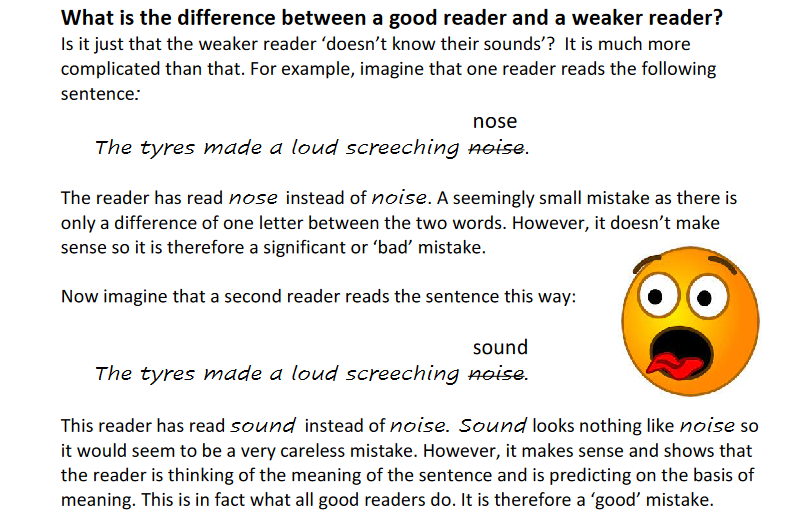
The elephant-in-the-room fact that millions of Australian adults have poor literacy skills is back in the news. Radio National’s AM program reports that the government is concerned millions of adults are missing out on jobs, or are ashamed to even apply for work, because they lack basic reading, writing and numeracy skills.
We’ve known about this problem since the 1996 ABS Adult Literacy Survey, but nobody in the adult literacy sector seemed to know what to do about it. Most of their teachers were sold the same Balanced Literacy story (balancing effective and ineffective) at university as other teachers, so that’s not too surprising.
If you cringed through SBS’s Lost For Words, or have browsed the Reading Writing Hotline website, you already know the adult literacy sector hasn’t really kept up with reading/spelling research. The RWH website’s “Literacy Face To Face” handbook for volunteer adult literacy tutors contains an explanation of how we read which goes beyond the three-cueing nonsense still being taken seriously in far too many schools, saying, “The efficient reader uses four sets of clues…” I kid you not. Section 1, page 4. Read it and weep. The screenshot above is from page 7. I really, truly am quite lost for words.
The Minister for Skills and Training, Brendan O’Connor, has commissioned a study to give the government a clearer picture of where adults lack basic skills. I think it also needs to get a clear picture of what scientific research has discovered about how we actually learn to read and spell, and how well this research is understood and translated into practice in the adult literacy sector. Or not.
If the study assesses adults’ reading and spelling, but not phonological processing skills, it will be about as informative as studying an iceberg by examining the part sticking out of the water, while ignoring the part under the water, holding it up (or not). If you’d like to tell the people designing the research this, or anything else, click here and do it before April 24th.
The Chief Executive of the Australian Industry Group, Innes Willox, says basic skill shortages are a national crisis for employers. In their 2021 survey of over 300 employers, 99% said that they’d been disadvantaged in some way because of basic skill shortages among current or prospective staff.
The Chief Executive of the National Apprentices Employment network says an apprenticeship is not a training program in literacy, numeracy or digital skills, and good candidates are missing out because they lack foundational skills.
There’s no shortage of heavyweights who know we have a serious adult literacy problem. I wish we could be confident there were plenty of people in the adult literacy sector offering serious, evidence-informed solutions. The solutions will probably have to come from outside the sector, from people like the readers of this blog. Please, go for it!
The similar-looking word test
43 Replies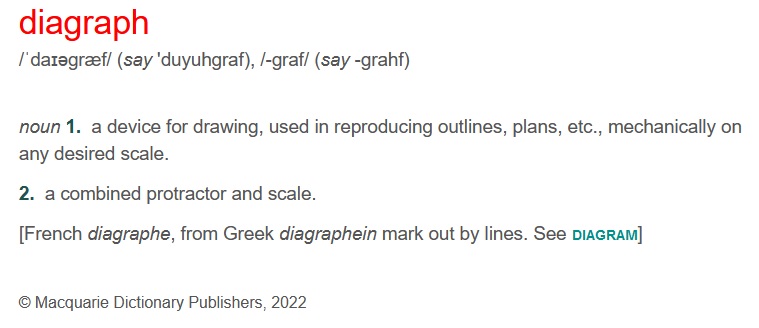
Clients who seem to read well, but spell poorly, are often referred to our service.
Their word-level reading is rarely as good as it seems. While they’re reading connected text, they’re relying on their oral language skills to help them identify the words. Take the supporting context away, by asking them to read lists of words, and they’re usually much less accurate. Their pseudoword decoding/word attack is also often quite weak.
(more…)Context can reduce accurate word learning
15 Replies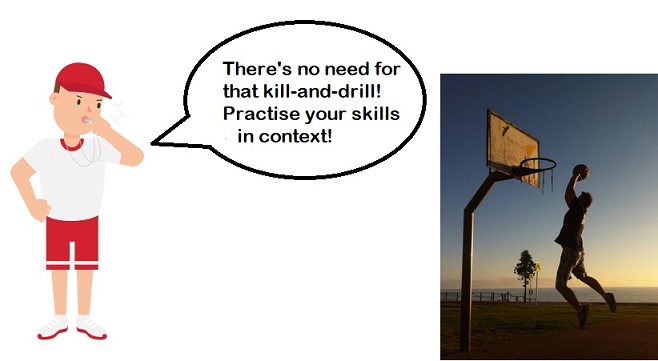
I’ve been reading an interesting 2017 dissertation by US researcher Reem Al Ghanem in preparation for this month’s DSF conference. It’s about how children learn to read and write polysyllabic words.
One section jumped out at me, because multi-cueing and the idea that phonics/word study should occur in context is still popular in many Australian schools:
“When poor readers rely on context to aid word recognition, they focus on selecting semantically appropriate words given the context clues rather than decoding the words through letter-sound conversion strategy.
“When children utilize a compensatory strategy like contextual guessing rather than phonological decoding to aid their word recognition, their attention to word form is limited, resulting in poorer acquisition of word-specific representations, hence the negative context effects.
“When poor readers are presented with words in isolation, they are forced to read them using phonological decoding. Although inefficient, their phonological decoding of the words increases their attention to the orthographic details of the words, resulting in acquiring higher quality representations for the words than when they are presented in
context.” (p103)
Developing high-quality word representations is a challenging activity for struggling readers. Expecting them to only learn words in context is a bit like asking them to only learn to shoot netball or basketball goals during a real game, and discouraging goal-shooting and other skills practice.
As a weedy, unco, asthmatic kid keen to avoid on-court humiliation, I voluntarily did many hours of goal-shooting practice. Imagine if coaches discouraged such practice, and said sporting skills should only be learnt in the context of real games. We’d all stare at them. Then ignore them.
Al Ghanem’s dissertation goes on:
“While context clues can support comprehension, they are unreliable sources for orthographic learning. Teachers must select the instructional strategy that fits the goal of instruction, and presenting words in isolation appears to be the most beneficial when the goal of instruction is acquiring word-specific representations.” (p107)
Dyslexia is not a visual problem, or a gift
58 Replies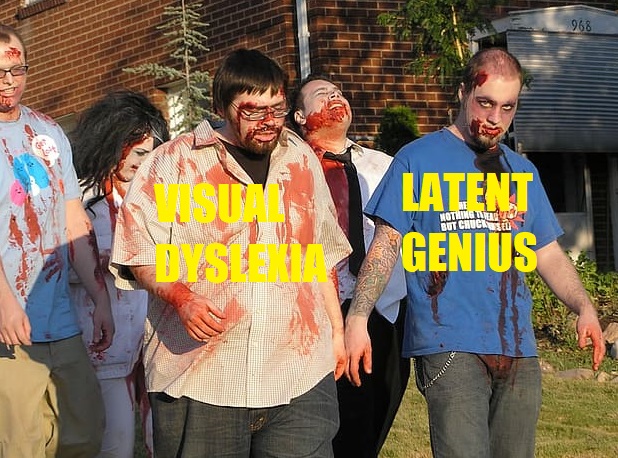
Dyslexia means severe difficulty reading words, despite adequate intervention and effort. It can start in adulthood after a stroke or injury, but typically begins in childhood for no immediately obvious reason. A detailed definition can be found here.
Is dyslexia a visual problem?
Dyslexia is not a visual problem, it’s a language-based problem. Like many others, I’ve said this before (here, here, here, here, here, and here) but the zombie idea of ‘visual dyslexia’ still seems to be wasting children’s time, and parents’ and taxpayers’ money, so it bears repeating.
The American Academy of Paediatrics’ Opthamologists’ Joint Statement on Learning Disabilities, Dyslexia and Vision says:
American Academy of Pediatrics Section on Ophthalmology Executive Committee, 2008-2009, reaffirmed 2014, https://www.aao.org/clinical-statement/joint-statement-learning-disabilities-dyslexia-vis
This statement has been endorsed by the Royal Australian and New Zealand College of Opthamologists. It has five pages of scientific references. Please share it with anyone who is considering vision-based dyslexia interventions like behavioural optometry, coloured overlays, Irlen lenses, the Lawson anti-suppression device, or special dyslexia fonts.
For more detail on controversial vision theories and therapies, visit the American Academy of Opthamology website, read this 2019 article in The Conversation, this 2018 article on the website Science Based Medicine and/or this article by Dr Kerry Hempenstall in the 2020 International Dyslexia Association journal. A 2019 systematic review re “Irlen Syndrome” (read it here), found lack of evidence that Irlen Syndrome exists, and lack of evidence that the treatments proposed for it work.
Children’s learning time is precious, and parents’ and taxpayers’ money needs to be spent wisely.
Do dyslexic people have special talents/gifts?
There are lots of smart, talented, capable people with dyslexia. Some have achieved great things in mathematics, science, art, architecture, entrepreneurship and other fields. They have shown that it’s possible to have dyslexia and still succeed in life.
It’s complete nonsense to flip this and suggest dyslexia gives you special talents and makes you more likely to succeed in life than average. The plural of anecdote is not data.
However, these claims persist, and interventions which lack scientific evidence are still being promoted and taken seriously. A Melbourne school this week helped market a Davis Dyslexia webinar, with an ad making extravagant claims about the special talents of people with dyslexia. Happily, readers of this blog alerted the school leadership to what turned out to be a mistake by the marketing team (thanks, Karen, Heidi and Nancy!), and the ad was removed, kudos to the school for acting so swiftly.
To establish a correlation between dyslexia and life achievement, scientific researchers would need to study a large, random sample of the population. They’d measure reading skills and levels of success/achievement (however that’s defined, I’m sure sociologists have ideas). They’d statistically analyse their data.
Three outcomes would be possible: 1) no correlation beyond what could be accounted for by random chance, 2) a correlation with above-average achievement, and 3) a correlation with below-average achievement. Even if a correlation were found between dyslexia and high achievement, correlation is not the same thing as causation. A third factor might be involved, or there might be multiple factors.
After this blog post was published, I heard from one of the co-authors of a 2021 systematic review of research into whether dyslexia conveys a creative benefit. Their results suggest that “individuals with dyslexia as a group are no more creative or show greater variability in creativity than peers without dyslexia”.
The whole ‘gift of dyslexia’ idea is also IMHO also rather cruel. It’s like telling a dyslexic child, ‘Not only are you expected to overcome your dyslexia, but I expect you to excel at something like art, architecture or entrepreneurship. No pressure.’
Children with word-level reading difficulties, whether they have dyslexia diagnoses or not, should have intensive, systematic, synthetic phonics teaching as part of a literacy curriculum based on scientific research (a useful, free evaluate-your-curriculum checklist is here). Like other children, they should be told they’re expected to play, have fun, rest and do their best at things that matter and things they love, however they decide to spend their one wild and precious life.


